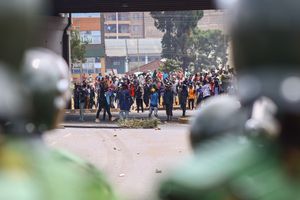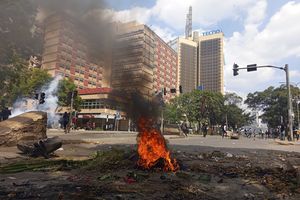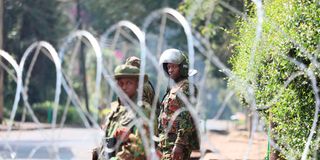
State House Road barricaded with a razor wire. Access is cut off approximately 200 metres from gate D.
Katiba Institute has sued Inspector-General of Police Douglas Kanja over alleged violation of the Constitution by barricading roads in Nairobi's central business district during the Gen-Z anniversary protests.
The group says the use of razor-sharp barbed wires and police blockades to lock out citizens from accessing the capital city was unlawful and amounted to a suspension of rights.

Razor-sharp barbed wire at the entrance to Parliament Road on June 25, 2025.
It argues that the IG "has abrogated to himself the sole privilege to determine when a right under the Constitution can be enjoyed even without issuing a notice to the citizens". Also sued alongside the IG is Attorney-General Dorcas Oduor.
Through lawyer Joshua Malidzo Nyawa, the organisation says the State's move came in the backdrop of a recent High Court verdict which held that the Police Inspector-General could not ban protests in the CBD and that suspension of rights without due process raises concerns about the legitimacy and fairness of the administrative action.
"The Inspector-General of Police is abusing the security agency to violently silence and punish citizens voicing their opposition to the current state of affairs in Kenya, in the streets of towns and cities, and online," says the lawyer.
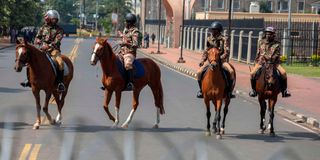
Police on horseback patrol along Parliament Road Nairobi on Wednesday, June 25, 2025 during the first Anniversary of June 25 protests.
He argues that the IG and the Attorney-General, through their juniors and agents, have continued to interfere with the enjoyment of the rights guaranteed by the Constitution.
"Through actions that evidence a police state, the Respondents barricaded the roads leading to the Central Business District in Nairobi in a bid to ensure that Kenyans do not enjoy their right to demonstrate and picket as guaranteed by the Constitution. Despite Kenyans complying with the law and having given notice to the police of the planned demonstrations, the Police did not notify Kenyans that they will be blocking roads or streets to or within the Central business district," says Mr Nyawa.
According to the lawyer, the blocking of roads countered the usual and accepted practice of giving notice of planned non-emergency road closures through notices on the Kenya National Highways Authority’s website.
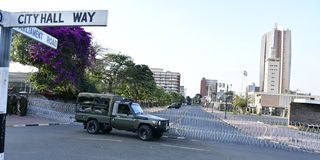
Razor-sharp barbed wire at the entrance to Parliament Road.
In this case, Kenyans woke up to find major roads leading to the Capital City had been blocked by police, and vehicles had been turned away, which the lawyer says effectively meant protests had been banned in the CBD.
"The respondents want to establish a militarized society where police barricade roads without notice or reasons are provided to the public. In a human rights state, the government cannot fear its citizens to the extent of unlawfully limiting or suspending their rights," says Mr Nyawa.
"In a human rights state, the government cannot unreasonably block public streets and roads that had been announced as the location for the lawful and peaceful exercise of the right to protest, using barbed wire. Such an action is an attack on our democracy, and it risks converting our country into a police barbed wired state," he adds.
The group wants the court to restrain the IG or any law enforcement officer subordinate to him from unlawfully limiting the Constitutional rights by cancelling, disrupting, or interfering in any way with the right to assemble, protest, or picket while peaceful and unarmed.
After hearing of the case, it wants the court to declare that the actions of the police to block roads were unconstitutional and amounted to a suspension of the Constitution.
It also wants the court to issue a permanent order prohibiting the Inspector-General and the Attorney-General from unlawfully limiting the enjoyment of Constitutional human rights, such as the right to picket and demonstrate and the freedom of movement without an advisory to the public.
Katiba's executive director, Nora Mbagathi, said while the right to peacefully protest and assemble under Article 37 of the Constitution is provided as a permanent provision, the State has attempted several times to limit the enjoyment of the said Constitutional right.
"The curtailment of the right has been piecemeal. The Respondents resorted to the use of extra-constitutional measures. The Inspector-General of Police has neutered the citizen’s rights in Articles 37 and 39 of the Constitution. He has grabbed for himself the sole privilege of determining of how Kenyans will exercise their right to protect and enjoy their right of movement," stated Ms Mbagathi in an affidavit.
She noted that if the police were to limit rights and freedoms, then such limitation must follow due process and not see the public waking up to streets blocked by barbed wire.
While pleading for an urgent order prohibiting police from blocking roads or banning protests, Ms Mbagathi said in the absence of an order, the State is likely to continue to violate the Constitution and the Bill of Rights by unlawfully limiting permanent Constitutional provisions.
"The respondents’ actions are contrary to the public interest. Unless the orders sought are granted, the respondents risk converting the country from a Constitutional democracy into a police state characterized by wanton human rights violations," she pleaded.
She added: "The Respondents risk rendering the Constitution useless. The Respondents risk taking a further step towards converting our democracy into an autocracy".
The petition is pending hearing directions at the High Court in Milimani, Nairobi.

